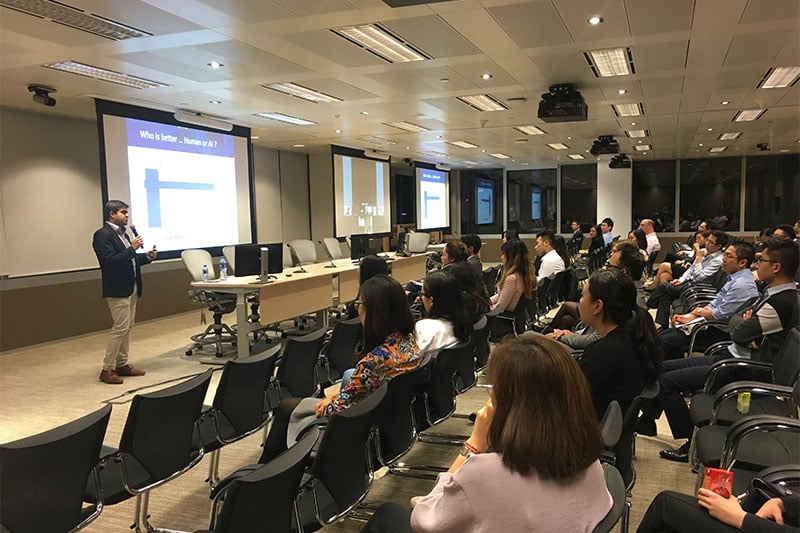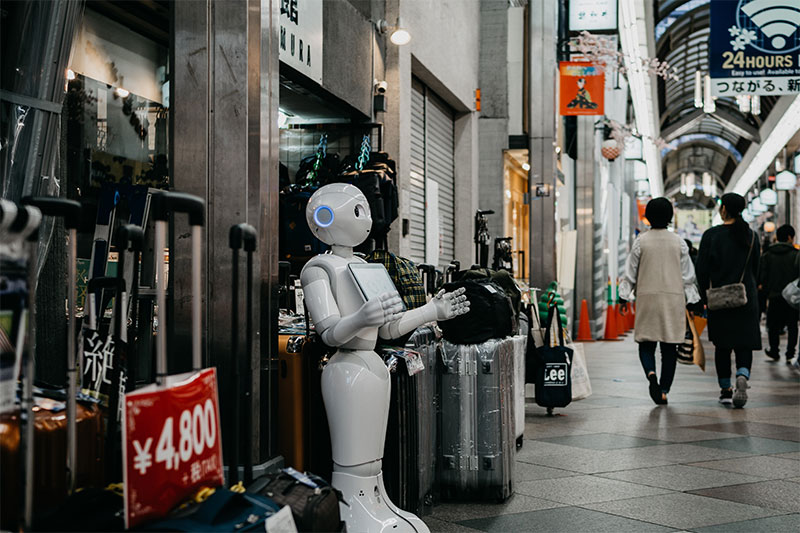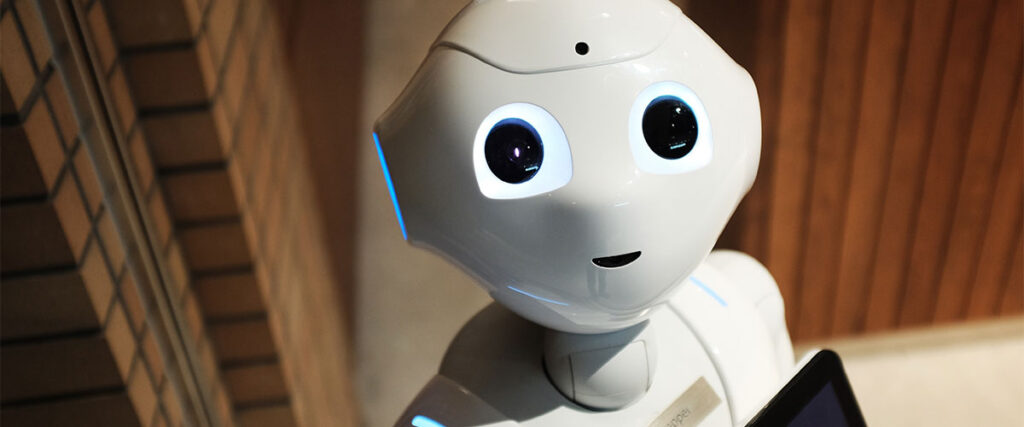In part II of our two-part feature on AI, Kevin Pereira, MD of AI consulting firm Blu Artificial Intelligence, unravels the effects AI could have on our future.
From fears of the unforeseen to fears of misuse, part I of our two-part feature on AI focused on the various myths and rumours circulating about AI. In our second and final article, we continue the dialogue with Kevin Pereira, MD of Hong Kong-based AI consulting firm Blu Artificial Intelligence, as he walks us through AI’s social implications for our future, and shares his opinions on why the AI scene in Hong Kong is dragging its heels behind China.
Whether you’re scared of AI or excited by it, it’s impossible to deny technology is going to change everything, not just your work life. Blu has given some thought to designing social systems for the future and one such plan pertains to the much-talked-about topic of universal basic income (UBI). In a simplified nutshell, UBI is a type of welfare program in which all citizens of a country receive a regular, liveable sum of money from the government to cover all their basic necessities. However, a key component of success for a program like this is the method through which it is funded. “Here’s an idea,” begins Kevin, “let’s say John can produce 100 units of output, and a robot can produce 500 units of output. Why don’t we replace John with the robot and tax said robot 20%. That 20% supplies us with 100 units of output which we can then allot to John for his basic necessities. Assuming this works, and that’s a big assumption given historical challenges with distribution of wealth, the question then becomes, what does John really want to do?”

‘What do you really want to do?’ – now that’s a question, and it’s one some find uncomfortable to answer. “When you talk to people from countries with strong social safety nets, they often say ‘oh, someone’s going to take my job away and give me a lot of money? That’s awesome!” laughs Kevin. “But in Asia, the mentality is a little different. When asked to ‘tell me a little about yourself,’ a lot of people in Asia tend to say ‘I’m a doctor’ or ‘I’m a lawyer,’ which seems to suggest that their job or function makes up a core part of their identity. So if AI does, in fact, come in and substitute those jobs, many Hong Kongers may feel like they’ve lost a significant piece of themselves, and I think that’s psychologically a very scary idea. If anything, it further feeds into the fear of AI we were talking about before.”
On the hot-button issue of UBI, there are two schools of thought. On the one hand, there’s an assumption that if we give people free money, then they’re just going to “sit on their ass and do absolutely nothing.” On the other, there’s the idea that now that John’s been financially freed, he can go and do what really gives him intrinsic satisfaction. “For example, I love playing football. But I’m pretty sure I’d never be able to make any money from it. Yet, if I woke up tomorrow to find out that all my financial necessities were taken care of, then I’d play football all day, and I’d probably be really happy,” Kevin explains. “An important part of this introspective process is figuring out what it is that gives you that non-monetary intrinsic satisfaction!”
Another area being focused on by businesses is in the harnessing of emotional intelligence machines for retail purposes. “Say you have a physical store, now imagine you can have a camera in the corner of that store which not only keeps an eye on your foot traffic but, also, through its eye-tracking technology, can decipher where people’s interests lie based on where they head to within the store and what displays they are looking at. Through emotive analytics based on customers’ faces, the technology can judge how they feel. Picture seeing someone looking at your product and being able to tell exactly how they respond emotionally. That’s powerful stuff, right? My sense is that most buying decisions are inherently emotional, and if that’s the case, then being able to discern someone’s emotions when they look at your product would be the holy grail for a marketer.”

For all this encroachment into the human experience, however, there is one area in which Kevin is sure of AI’s limits – and that’s any situation involving human-to-human interaction, particularly in the realms of empathy and storytelling. “A recent storytelling workshop I was at said that when you tell a story, you create empathy with the reader,” begins Kevin. “The empathy chemically translates into your brain releasing oxytocin, which is a bonding hormone, making you feel more involved in what’s being said. There’s also a release of cortisol, which is a stress hormone, making you more focused. The combination of these two greatly improves your chances of remembering what you’re being told. To put this in a business context, if you’ve got the soft skills of storytelling and empathy, and you’re able to better sell whatever story you’re telling, that’s powerful stuff that is unique to humans.”
These big ideas notwithstanding, AI still has a way to go – not least in Hong Kong. “We’re definitely behind, says Kevin. ”If you look at the AI situation in China, it’s far more advanced. Part of the reason for this is that China has a lot of AI talent, and a lot of that talent is very cheap. Another is that China’s rules on privacy, especially those on data, are relatively less stringent than other countries.” On top of that, there’s also a willingness to embrace new technologies. “I was in Shanghai a couple of months ago at a wet food market when I noticed a butcher scanning QR codes for payments. To me, that’s really cool.” If Hong Kong is less quick to adapt, that could be, in part, because the current system is already relatively seamless, and more importantly, ingrained in society. “Take your Octopus card, for example. 20 years ago, it was a phenomenal innovation. Today, a lot of people still don’t see the point of buying into new technologies. Getting onto the subway with your octopus card takes 3 seconds compared to the 1 second that the facial recognition technology would take, but how much is that 2-second benefit really worth to your customer or to the business? In some cases, it might matter. At McDonald’s for instance, 2 extra seconds gained per customer throughout the day might mean many more new customers, but for the most part, the benefit is probably marginal. In contrast, going from cash to facial recognition in the payments space in China is a massive jump from where they are, so the appeal to both the end consumers as well as the businesses serving them is greater.”
If you’re looking to get into AI industry or associated innovations functions, but are intimidated by the sheer wealth of information out there, you’re not alone. “Setting out to educate yourself for the first few months is like literally trying to drink out of a fire hose because there is so much out there,” laughs Kevin. “But once you figure out what it is that interests you, it becomes a lot easier. If you like cars then reading about autonomous cars is not a chore, it’s actually really fun. For anyone looking to get into AI, I’d say start with your passion, and then figure out what are the business use cases that you could potentially use AI technology for. And if any of you readers are interested in learning more about AI and want to chat, I’m always up for a cup of coffee and some thought-provoking discussion!”





